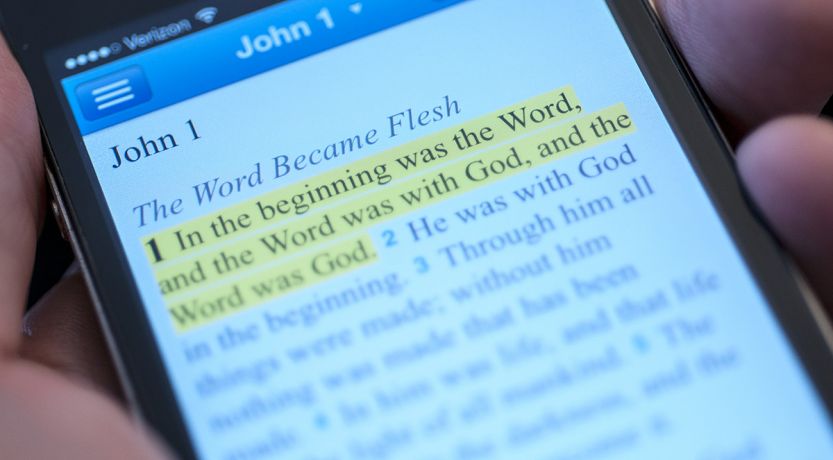Most connect Jesus with the New Testament, but was He also in the Old Testament? Was Jesus actually the God who interacted with humans in the Old Testament?

Who was the God who appeared in the Old Testament?
The Bible shows that the One who later came to earth as Jesus Christ was the God who interacted with Israel in the Old Testament. (God the Father is mentioned in the Old Testament, but did not appear to people.)
When some people read the Old Testament scriptures, they consider God to be harsh and vindictive. This view may be based on simply reading some of the well-known stories of the Old Testament.
Old Testament examples used to describe God as harsh:
- God expelled Adam and Eve from the Garden of Eden and destroyed the earth with a flood.
- He sent plagues on ancient Egypt.
- He directed Israel to conquer Canaan through war.
- He punished Israel and Judah through captivity by foreign nations.
Many interpret these as the actions of a stern God of retribution and justice.
New Testament examples used to describe Jesus as gentle:
On the other hand, many see Jesus in the New Testament as quite different. The New Testament scriptures present Jesus Christ, the Son of God, teaching about love toward others, showing mercy, healing multitudes of people, gently holding children in His arms, and giving His life as a sacrifice to save people from their sins.
Comparing these examples, some have concluded that the Old Testament God was the Father—the harsh God of justice, judgment and punishment. And that the New Testament God was Jesus, the Son—the God of love, kindness and mercy.
Some even believe Jesus came to stand in the gap between us and the Father—essentially delivering us from His Father’s restrictive law and desire to punish us for our sins!
But is God different in the Old and New Testament?
Actually, when we study the Old Testament and New Testament closely, we discover that those stereotypes are not accurate. In the Old Testament, God is described as being kind, loving and gentle (Deuteronomy 10:18; Psalm 86:5; Isaiah 40:11). In the New Testament, Jesus could be very strong and firm against sin when He had to (Matthew 21:12-13; 23:13; Mark 8:33).
Was the Father the God we read about in the Old Testament?
John revealed a surprising truth about the Father in John 1:18: “No one has seen God at any time. The only begotten Son, who is in the bosom of the Father, He has declared Him” (emphasis added throughout).
Jesus also said, “And the Father Himself, who sent Me, has testified of Me. You have neither heard His voice at any time, nor seen His form” (John 5:37).
These two scriptures teach us an important fact: The Father has not directly spoken to or been seen by any human being at any time.
But when we read through the Old Testament, we see many occasions when God was seen by, and communicated directly with, human beings. The theological term for this is theophany. A theophany is when God allows Himself to be seen or heard by a human being.
Here are two examples of theophanies in the Old Testament:
- “Then the LORD God called to Adam and said to him, ‘Where are you?’ So he said, ‘I heard Your voice in the garden, and I was afraid because I was naked; and I hid myself’” (Genesis 3:9-10). Adam clearly heard God’s voice.
- “So the LORD spoke to Moses face to face, as a man speaks to his friend” (Exodus 33:11). Moses clearly heard and saw God.
There are many other theophanies that show God interacting directly with people in the Old Testament (Genesis 2:16-17; 6:13-14; 12:1; 17:1; 18:1; Exodus 3:4-6; 24:9-11; 33:22-23; Numbers 12:6-8; Deuteronomy 4:33; Jeremiah 1:4-10).
We see that in the Old Testament a divine being who identified Himself as God and the LORD dealt directly with people. But, according to Jesus, this divine being could not have been God the Father.
We see that in the Old Testament a divine being who identified Himself as God and the LORD dealt directly with people. But, according to Jesus, this divine being could not have been God the Father because Jesus specifically said that no human being had ever heard or seen the Father.
Jesus also said that one of the reasons He came to earth was to “reveal” the Father (Matthew 11:27). If the Father were already widely known to Israel as the God who appeared throughout the Old Testament, there would be no need to reveal Him! Jesus came to reveal the Father because people did not know Him.
But if the One who revealed Himself to the patriarchs and Israel in the Old Testament was not the Father—then who was He?
(To learn about what God the Father does, read our articles “What Does God the Father Do? Part 1” and “What Does God the Father Do? Part 2.”)
Jesus is God in the Old Testament
A careful study of the Bible shows clearly that the God who interacted with humans in the Old Testament was the One who became Jesus Christ.
The most clear scripture is found in John 1:1: “In the beginning was the Word, and the Word was with God, and the Word was God.”
In verse 14, this being called the Word is clearly identified as Jesus Christ: “And the Word became flesh and dealt among us, and we beheld His glory, the glory as of the only begotten of the Father, full of grace and truth.”
Jesus is clearly the being called the Word. Here are three things we learn about the Word (Jesus) from John 1:1:
- He existed at the beginning of the created order (meaning He existed before the beginning of all things). This is another way of saying He had no beginning—He is eternal.
- He existed with another being known as God.
- He Himself is also God.
So, before He was born to Mary, Jesus was called “the Word.” But what does this title tell us about Jesus before His human birth?
“Word” in John 1:1 is a translation of the Greek word Logos, meaning “a word” or “something said” (Strong’s Greek Dictionary). The definition includes both the thought and the spoken word.
This title makes sense when we connect it to the scriptures we have already explored about the God of the Old Testament communicating with human beings. He was the being who spoke.
When God’s message or revelation was given, it was given through the Word—who became Jesus Christ—or an angel. The Father has never spoken directly with human beings.
The Word was, essentially, the being who served as the spokesman on behalf of the Father. He has always been responsible for communicating the will of the Father to human beings—during Old Testament and New Testament times. When God’s message or revelation was given, it was given through the Word—who became Jesus Christ—or an angel. The Father has never spoken directly with human beings.
Jesus Christ made His identity very clear—sometimes even to the detriment of His physical well-being! In John 8 Jesus said He knew Abraham (verse 56).
Since Abraham had lived and died nearly 2,000 years before, this statement offended the Jews Jesus was talking to. They considered it blasphemy that a mere man (as they viewed Him) “not yet fifty years old” had the audacity to claim He had known their patriarch Abraham (verse 57).
But Jesus’ response was even more shocking to them: “Most assuredly, I say to you, before Abraham was, I AM” (verse 58).
Yes, Jesus Christ claimed that He predated Abraham. But, in saying this, Jesus also gave a not-so-subtle clue about His identity that wasn’t lost on the angry Jews who surrounded Him. He referred to Himself as “I AM.” This was actually a divine title of God!
When He appeared to Moses from the burning bush, God identified Himself as “I AM WHO I AM” and “I AM” (Exodus 3:14).
What is the significance of the name “I AM”?
By identifying Himself as “I AM,” Jesus claimed that He had eternally existed.
Jesus Christ identified Himself as the God of Abraham and Moses, and the One who led Israel out of Egypt.
Years after Jesus called Himself “I AM,” the apostle Paul reinforced Christ’s identity as the God who led Israel in the wilderness in 1 Corinthians 10:1-4:
“Moreover, brethren, I do not want you to be unaware that all our fathers were under the cloud, all passed through the sea, all were baptized into Moses in the cloud and in the sea, all ate the same spiritual food, and all drank the same spiritual drink. For they drank of that spiritual Rock that followed them, and that Rock was Christ.”
The God who provided water out of a rock for the Israelites and who protected them day and night was the Word (the One who later came as Jesus Christ).
To learn more about the meanings of God’s many names, read “Names of God.”
God created all things through Jesus
Before His human birth, Jesus Christ was the One through whom God created all things. The apostle Paul made this fact very clear in his writings.
We read that “God [the Father] … created all things through Jesus Christ” (Ephesians 3:9). Jesus Christ, the Word, under the Father’s direction, created “all things”—the angelic realm, the physical universe and all physical life.
Colossians 1:16-18 reveals more functions of the Word. Not only were “all things … that are in heaven and that are on earth,” created though Him, but He also rules over all authorities and powers that exist under the Father. This means that Christ has authority over the entire angelic and human dominions. He existed “before all things” (He is eternal), and “in Him all things consist” (verse 17).
Here are two more verses that reinforce the truth that the Father created all things through the Word:
- “There is … one Lord Jesus Christ, through whom are all things, and through whom we live” (1 Corinthians 8:6).
- “God … has in these last days spoken to us by His Son, whom He has appointed heir of all things, through whom also He made the worlds” (Hebrews 1:1-2).
To learn more about why Jesus was never created Himself, read “Was Jesus Created?”
How Jesus and the Father are one
We have just skimmed the surface of this incredibly important topic. There is much more to understand about the identity of God the Father and Jesus Christ. But the key truth to understand is that God the Father and Jesus Christ the Son exist in total harmony.
That is what Jesus meant when He said, “I and My Father are one” (John 10:30). They share the same perfect character of love, truth, mercy and grace. They think alike, and when the Son speaks on behalf of the Father as the Word, He perfectly communicates the will and intent of God the Father (John 14:24).
Though the Father did not speak directly to people, He is mentioned in the Old Testament (for example, both Father and Son are evident in verses like Genesis 1:26; 11:7; and Psalm 110:1). The Father has chosen to accomplish His plan for mankind through Jesus, from beginning to end.
Not only is the character of God (both Father and Son) consistent at all times, God’s expectations for human beings also remain the same. It is vital for us to study and understand both the Old and New Testaments (1 Corinthians 10:11; 2 Timothy 3:16). God’s spiritual law—summarized for us in the 10 Commandments—has remained consistent and binding.
To learn more about the consistency of God’s character throughout the Bible, you may find it helpful to study our infographic “The Consistent Characteristics of God From the Old to New Testament.”
God the Father and Jesus Christ are truly “the same yesterday, today, and forever” (Hebrews 13:8; Malachi 3:6)!
So who was God in the Old Testament?
To summarize, in most places the God we read about in the Old Testament was the One who later came as Jesus Christ.
Jesus Christ was the One through whom the Father created all things, who interacted with human beings like Adam and Moses, and who led Israel out of Egypt and through the wilderness. He did all these things on behalf of the being known in the New Testament as God the Father.
God the Father is the supreme authority in the God family and directed the Word (Christ) in all that He did. The Father and Son work together in perfect harmony as a team.
We encourage you to learn much more about the Father and the Son by exploring two important sections of the LifeHopeandTruth.com website: “Who Is God?” and “Who Is Jesus?”
12 Proofs That Jesus Christ Is God and Eternal
- Jesus was the Word who existed before the beginning, was with God and was God.
John 1:1-3; Revelation 19:13. - Jesus existed before Abraham and called Himself “I AM.”
John 8:57-58; 17:5. - Jesus is called both God and Savior.
Titus 2:13. - Only God can be called our Savior.
Isaiah 43:11; 45:21; Hosea 13:4; Titus 3:4; 2 Timothy 1:10. - Thomas called Jesus “my Lord and my God!”
John 20:28. - Isaiah prophesied that one of the Messiah’s titles is “Mighty God.”
Isaiah 9:6-7. - Micah prophesied that the Messiah would be “from everlasting”—another way of saying He always existed.
Micah 5:2. - No one has seen or heard the Father, yet the God of the Old Testament was seen and heard by some, meaning this being must have been the One who later came as Jesus Christ.
John 1:18; 5:37; 1 John 4:12; Exodus 24:9-11. - The Son is directly referred to as God.
Hebrews 1:8; 5; Luke 20:41-44. - Jesus is the Lord who would sit at the Father’s right hand.
Psalm 110:1, 5; Luke 20:41-44. - Jesus Christ was before all things and responsible for the existence of all things.
Colossians 1:15-17. - Jesus was God “manifested in the flesh.”
1 Timothy 3:16.





